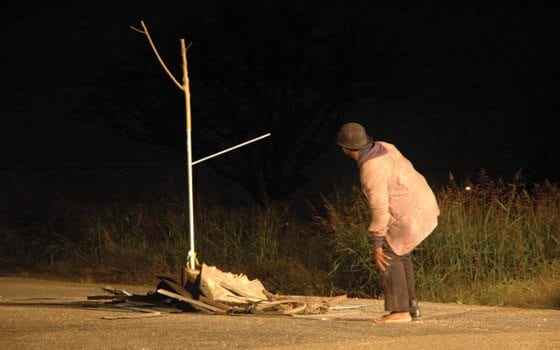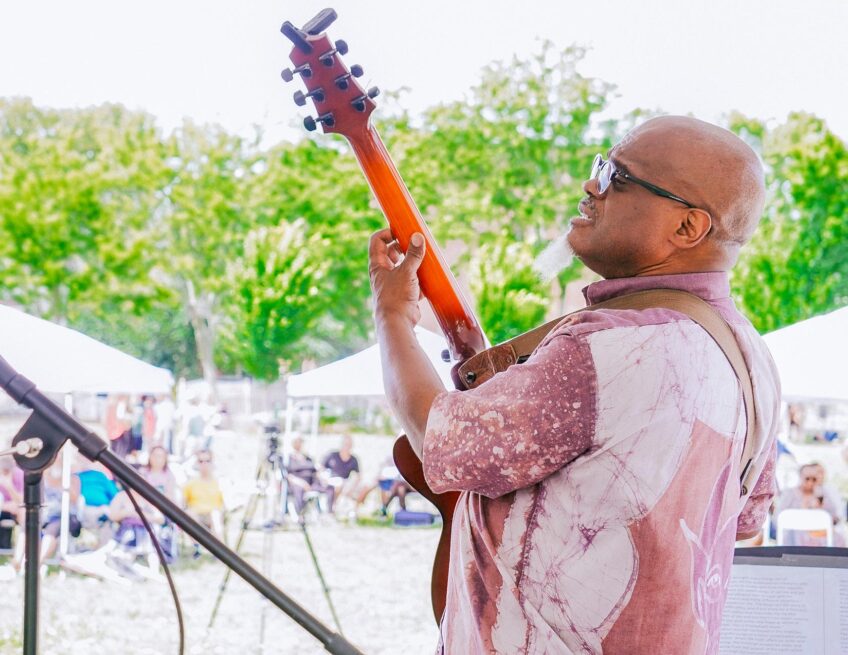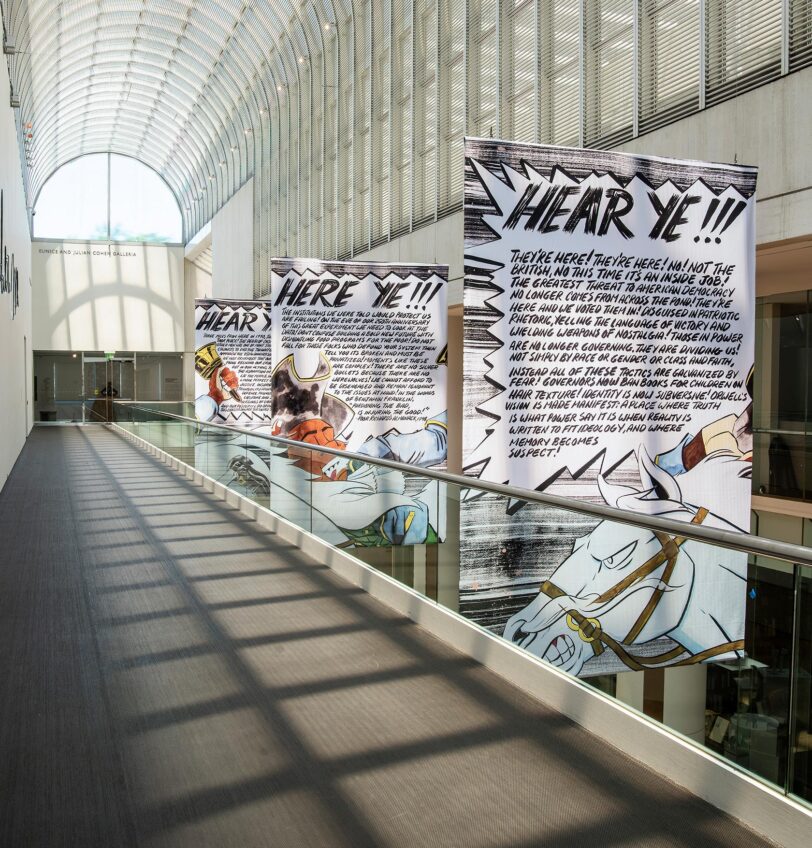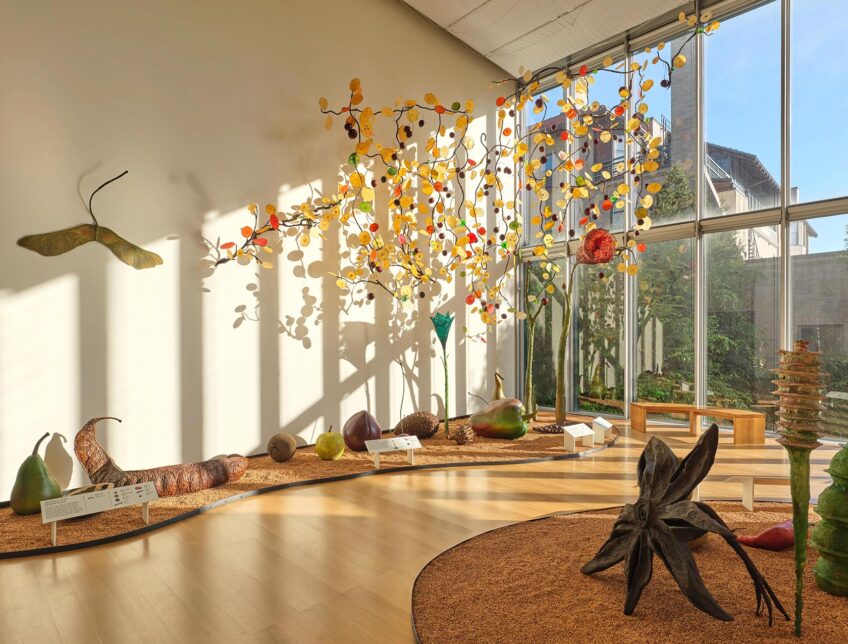
When Hurricane Katrina devastated much of the Gulf Coast in 2005, news of the federal government’s ineptitude was driven home by images of stranded families waving from rooftops. The following year, the Classical Theatre of Harlem staged an acclaimed, Katrina-inspired production of Samuel Beckett’s “Waiting for Godot” in a swimming pool on a Manhattan rooftop.
In 2007, the performance’s director, Classical co-founder Chris McElroen, brought the production to New Orleans’ Lower Ninth Ward. Performed on the steps of a flooded house, the five nights of free performances drew thousands of people, including many who had lost loved ones and homes in the hurricane and its ill-managed aftermath.
Now on tour with their production, McElroen and his company staged two performances of “Waiting for Godot” last weekend at the Institute of Contemporary Art, Boston (ICA). The inventive production uses Beckett’s stage directions as a springboard for a fresh rendering of the play. Like a jazz improvisation, it finds new, moving currents in a timeless classic — and mines its urgency.
Produced in settings ranging from war-torn Sarajevo and San Quentin State Prison to Broadway, Nobel Prize-winning Irish playwright and author Beckett’s 1953 masterpiece was, at first, slow to take hold. Its American debut at the Coconut Grove Playhouse in Miami in 1956, promoted as “the laugh hit of two continents,” starred the great Bert Lahr and drew audiences expecting a conventional comedy. At intermission, they left in droves. Two who stayed and admired the production were playwrights Tennessee Williams and William Saroyan.
Performing the role of Estragon, Lahr — who played the Cowardly Lion in the 1939 movie “The Wizard of Oz” — recognized the vaudeville humor of the play’s main characters, their bowler hats a nod to the famed comedy duo Laurel and Hardy. He also heard the echoes of music-hall repartee in their verbal duels, which vary in tone from coarse to lyrical.
Beckett gave “Waiting for Godot” the subtitle “a tragicomedy in two acts,” and once told a director that it is about “the laughter and the tears.” It portrays the pared-down essentials of human experience — the agony of waiting with uncertainty for deliverance and the capacity for laughter in the darkness.
Its spare structure begins with the most basic unit of human society — two people. They are tramps who have nothing but their hats, their tattered clothing and each other. The setting described in Beckett’s stage directions reads simply: “A country road. A tree. Evening.”
As they await the unknown but indispensable Godot, the tramps have two visitors, the autocrat Pozzo and his enslaved companion, Lucky. The play’s two acts take place over two days, and start and end with the same words: “‘Well, shall we go?’ ‘Yes, let’s go.’ They do not move.”
The traveling production’s stage set took advantage of the ICA theater’s floor-to-ceiling views of Boston Harbor. A levee-like barrier spanned the windows behind the stage, turning the water into a backdrop. Mid-stage, two paths crossed near a skeletal tree. Trash surrounded the set’s two structures — the filthy remains of a bathroom, its tub and toilet intact, and the sloping frame and front stoop of a destroyed house.
Injecting this desolate scene with warmth and deft physical comedy, Vladimir (Billy Eugene Jones) and Estragon (J. Kyle Manzay) convey both the affection and antagonism in the tramps’ friendship. “It’s all symbiosis,” Beckett said of the relationship, describing their burlesque antics and verbal sparring as “a game in order to survive.”
Early in the first act, one tramp pulls a piece of cardboard from the trash. He creates a crude sign saying “Godot.” and holds it skyward, evoking the televised images of stranded families signaling for help after Katrina hit.
The exchanges between Estragon and Vladimir have a rhythmic, repetitive give-and-take, the short, rapid riffs of speech building off of one another. As they trade insults, Jones and Manzay turn one dialogue into an impromptu rap, an inventive spin that is true to Beckett’s play. A few comic additions, however, seemed a bit forced in a play that draws its power from pared-down distillation — such as when the two actors mimic Michael Jackson singing “Billie Jean” or playfully imitate the shape of the tree with a yoga pose.
The physical and verbal ping-pong between the tramps is a way of passing time and whistling in the dark. Their symbiotic bond relieves their anguish as they await the unknown. Later, two visitors arrive who portray an equally symbiotic but less humane balance of power.
Attired in goggles and speaking through a megaphone, Pozzo (Christian Rummel) is crisply outfitted like a circus ringleader. He strides on stage snapping a whip and holding a rope tethered to Lucky (Glenn Gordon), his quivering slave. As he blows a siren to announce his arrival, Vladimir and Estragon drop to their knees, hands behind their heads as if being rounded up by police — another terrific satiric touch.
Dressed in tattered clothes like the tramps, Lucky bears his master’s suitcases and a stuffed trash bag. As Pozzo barks orders, Lucky moves in rigidly choreographed steps. He unpacks a stool and ritually seats Pozzo, who proceeds to enjoy a picnic while the other three look on.
Rummel gives a marvelously loud performance as Pozzo, a monster of self-absorption. After silently carrying out Pozzo’s orders, Lucky is commanded to think and, putting on a bowler hat, flawlessly delivers the play’s longest and most intricate monologue.
If at times this touring production tips in favor of laughter over tears, it retains the power of Beckett’s masterpiece, translating its raw poetry into an image of inhumane neglect that remains fresh in our nation’s psyche. As the second day ends and an off-stage actor returns to again announce, “Mr. Godot … won’t come this evening but surely to-morrow,” Jones’ Vladimir registers real rage.






